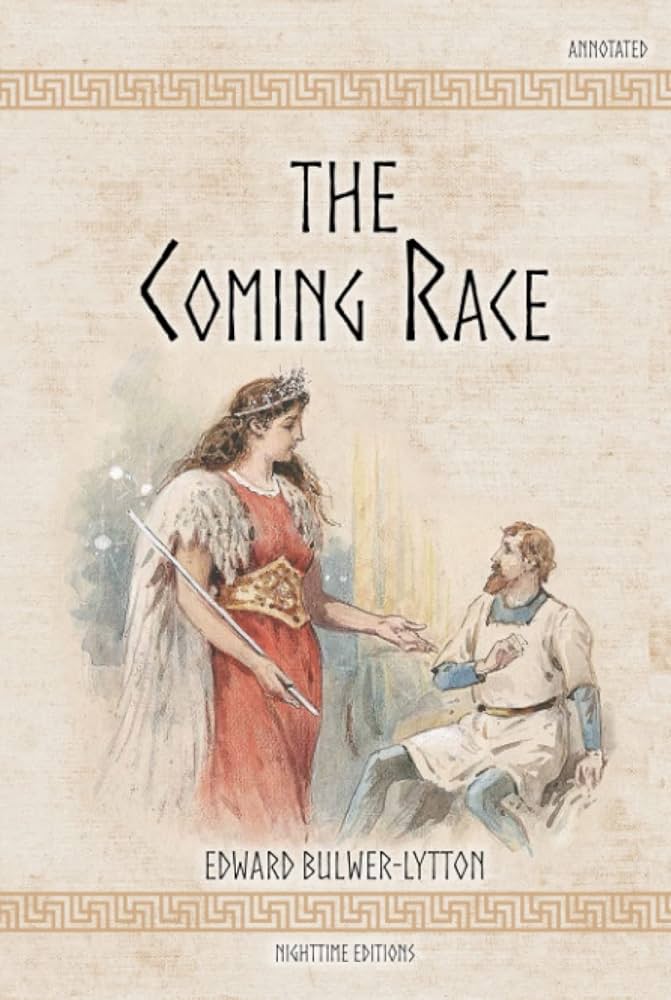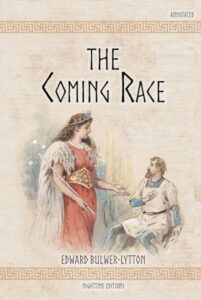Chapter XIII — The coming Race
byChapter XIII begins by illuminating how the Vril-ya have woven their spiritual beliefs into the very structure of their lives, making religion a quiet strength rather than a source of division. Their worship is neither ceremonial nor overly complex, but it is deeply rooted in sincere reverence. The idea that the divine is ever-present, perceiving even the most fleeting thoughts, grants them a strong sense of inner discipline. Rather than appealing to an external force through elaborate rituals, they focus on inner clarity and alignment. This quiet, inward spirituality fosters humility and thoughtful action. For them, living rightly is the truest form of worship.
Their connection to vril is central not just to their science but also to their theology. The energy they master is viewed not only as a physical force but as a sacred link between mind and cosmos. Thought itself, when shaped by truth and goodwill, is believed to reach the Creator instantly. This belief discourages deceit and elevates contemplation. Because of this, prayer is often silent, woven into daily moments rather than bound to formal occasions. Thankfulness is practiced not as obligation but as recognition of one’s place in an ordered universe. Gratitude, they believe, is the foundation of ethical behavior and emotional health.
Unlike many surface societies, the Vril-ya do not argue about religion. Their faith does not divide them because it avoids rigid dogma. They discourage defining the divine in rigid terms, seeing such attempts as limiting and even disrespectful. In their view, the Infinite cannot be captured by language or imagery without distortion. The divine is better understood through living justly, thinking clearly, and maintaining internal harmony. Their sacred texts, if any exist, are not discussed; instead, ethical conduct and wisdom carry more authority than writings. As a result, they experience fewer conflicts over belief and maintain a social unity rooted in mutual respect.
This spiritual simplicity creates emotional resilience. Because they view life as guided by a wise force and every event as purposeful, anxiety about suffering or loss is reduced. Tragedy is met not with despair but with trust in unseen justice. Children are raised not only to reason but to believe that goodness aligns with truth. The absence of religious conflict contributes to their social tranquility. While their technology empowers them immensely, it is their faith that tempers that power with restraint. The more control they gain over nature, the more they acknowledge the mystery behind its laws.
This balance between reason and reverence gives their civilization a rare harmony. By not institutionalizing religion, they avoid clerical corruption or religious hierarchy. Each citizen is seen as equally capable of spiritual insight, just as each can control vril according to their training. Temples, if present, are simple spaces for reflection rather than sites of control. Festivals are communal but understated, designed to uplift rather than impress. Their moral codes grow from this shared sense of purpose, not from fear of punishment. Even their legal systems reflect this spiritual ethic, favoring reparation over revenge.
As the narrator observes all this, he feels both admiration and unease. The peace of the Vril-ya is undeniable, but it is so complete that it challenges his assumptions about human nature. Can a society so free from doubt still be free in thought? He wonders whether their certainty leaves room for individual struggle—the kind that has birthed so much art and insight above ground. Yet he cannot deny their achievements, their balance of power and humility, their ability to live without fear. In this calm, he senses strength—not passive submission, but active harmony with a higher law.
Through this chapter, readers are invited to reconsider their own definitions of faith. Is religion meant to explain or to elevate? Must worship divide people into doctrines, or can it unify through a shared commitment to kindness and clarity? The Vril-ya offer one answer, showing that belief, when internalized rather than imposed, can produce not just order but joy. And perhaps, in this reflection, lies a challenge to the reader—to find within their own society a path toward simpler, deeper belief.


